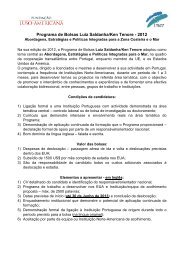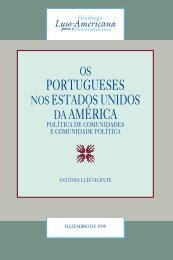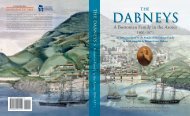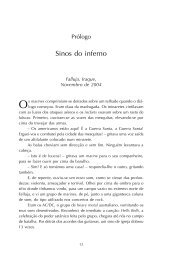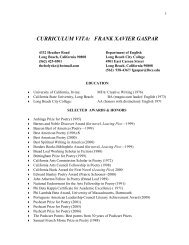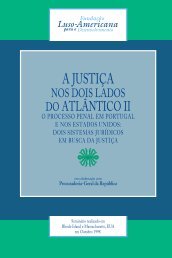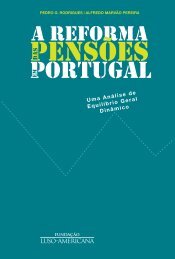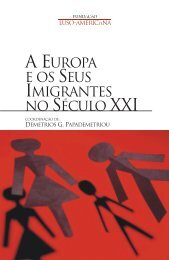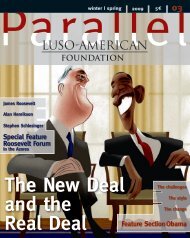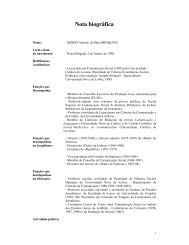A decade later - Fundação Luso-Americana
A decade later - Fundação Luso-Americana
A decade later - Fundação Luso-Americana
Create successful ePaper yourself
Turn your PDF publications into a flip-book with our unique Google optimized e-Paper software.
As far as entrepreneurship is concerned,<br />
it is accepted by investors that<br />
you learn the most if you reflect on why<br />
you were at fault. This is the extreme<br />
opposite of Europe, and it is Europe’s<br />
biggest challenge.<br />
It’s Europe’s biggest challenge because<br />
I think that for Europe’s market to be<br />
innovative, or try new things, there must<br />
be some appetite for risk, and some<br />
appetite for failure. It can’t be that if<br />
you try something and fail, your life is<br />
over. Even more so because the chances<br />
of being successful on your first attempt<br />
are so remote. Sometimes the greatest<br />
stories are the ones in which people fail<br />
many times.<br />
‘ in europe there’s this<br />
idea that people<br />
don’t fail.<br />
’<br />
[P] Would you say Americans are more innovative<br />
than Europeans?<br />
[MF] I think that Americans are willing<br />
to take risks that allow them to be more<br />
innovative. I don’t think they are any<br />
smarter or any more creative, or any<br />
more innovative. I think there’s a culture<br />
allowing them to take risks, a culture<br />
that says it’s okay to leave and start<br />
somethig new.<br />
[P] How about Little Kids Rock?<br />
[MF] Little Kids Rock is a non-profit<br />
company that we started in late 1999-<br />
2000. There was a school teacher who<br />
had an actual music school program.<br />
Then she and I partnered up. She knew<br />
how to teach kids to play music, and I<br />
knew how to bring people together. We<br />
brought in the accounting skills, managing<br />
skills, legal skills, and formed a<br />
board, and then together we started to<br />
raise money. We started with only 25<br />
kids in the US, and now we reach over<br />
a hundred thousand kids. We have over<br />
a thousand schools in the country, in<br />
20 different states.<br />
*with André Sebastião<br />
socieTy<br />
opportunities rather<br />
than money<br />
Professor of Strategy and Innovation<br />
Management at the Polytechnic Institute of<br />
Turin in Italy, and a member of the board<br />
of Italy’s National Agency for Innovation,<br />
Mario Calderini believes that governments<br />
must not focus exclusively on funding<br />
research to spark innovation.<br />
[Parallel] How can public policies enable countries<br />
to become more innovative?<br />
[Mario Calderini] National policy should<br />
stop giving direct money and finance<br />
to companies, and be more directed<br />
toward creating new business opportunities<br />
and new markets, using public<br />
demand. We should give customers and<br />
market opportunities to companies,<br />
rather than money. It’s something that<br />
makes a company take more risks, and<br />
become more innovative. If you give<br />
them money, they become lazy.<br />
[P] You said that too often, innovation is generated<br />
from the top down. Can you explain<br />
this?<br />
[MC] If the model were big companies<br />
with big research labs, or big universities<br />
doing a lot of research, then the<br />
innovation would just come out of these<br />
research activities. But nowadays, I think<br />
that the end-users/customers are very<br />
important sources of innovation. A lot<br />
of innovations that we have, for example,<br />
in the car industry and in the sports<br />
industry, come from customers not from<br />
research. They come from the demand.<br />
So I believe that we should consider<br />
research just one of the many sources<br />
of innovation; and why neglect all the<br />
others?<br />
[P] Is Italy investing too much in universities<br />
and research?<br />
[MC] I would say that research money<br />
shouldn’t be given to companies that<br />
do not do research. We could probably<br />
make better use of this money by giving<br />
it to universities and a few companies<br />
that really do research.<br />
By sArA pinA*<br />
The problem is that we have 77 universities,<br />
but probably only ten of them<br />
are able to generate state-of-the-art<br />
knowledge and new businesses. The<br />
choice is very clear. You either concentrate<br />
your funding on those ten universities,<br />
or you spread the money<br />
throughout the 77 universities. If you<br />
spread the money around, you have a<br />
more socially-oriented model of education<br />
and research, and every university<br />
would be able to do a little bit of<br />
research. But nobody will ever reach the<br />
critical mass needed to produce a high<br />
degree of knowledge.<br />
[P] Is it important to learn entreperneurship<br />
when you’re little? In primary or secondary<br />
school?<br />
[MC] Well, my personal view is that you<br />
shouldn’t start too early with entrepreneurship.<br />
You need to create young students<br />
with very flexible mindsets; and<br />
they need to be passionate about subjects<br />
like engineering and science. The<br />
important thing is for the educational<br />
system to help them be more openminded<br />
rather than entrepreneurial. The<br />
entrepreneurship comes <strong>later</strong>.<br />
[P] Wouldn’t you say that the educational system<br />
in Europe goes somewhat against this kind<br />
of open mindset?<br />
[MC] I absolutely agree. In general, if<br />
you take European undergraduate students,<br />
and then fund them to do PhDs<br />
or post-graduate programs in the US,<br />
they perform very well, because their<br />
educational background is very good.<br />
But of course the downside is that if<br />
they have been taught very strictly and<br />
are from very rigid programs, they’re<br />
often not used to being flexible. If you<br />
take an English student or – even moreso<br />
– an American student, they’ll probably<br />
spend less time studying out of<br />
books and more time enjoying themselves<br />
and becoming creative. So there<br />
are upsides and downsides.<br />
*with André Sebastião<br />
Parallel no. 6 | FALL | WINTER 2011 53



